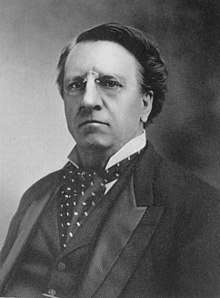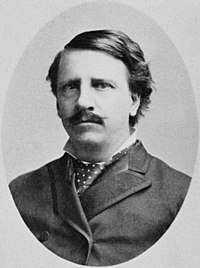John Coit Spooner
| John Coit Spooner | |
|---|---|
 | |
| United States Senator from Wisconsin | |
|
In office March 4, 1885 – March 3, 1891 | |
| Preceded by | Angus Cameron |
| Succeeded by | William F. Vilas |
|
In office March 4, 1897 – April 30, 1907 | |
| Preceded by | William F. Vilas |
| Succeeded by | Isaac Stephenson |
| Member of the Wisconsin State Assembly | |
|
In office 1872 | |
| Personal details | |
| Born |
January 6, 1843 Lawrenceburg, Indiana |
| Died |
June 11, 1919 (aged 76) New York City, New York |
| Political party | Republican |
| Children | Philip Loring Spooner |
| Signature |
|
John Coit Spooner (January 6, 1843 – June 11, 1919) was a politician and lawyer from Wisconsin. He served in the United States Senate from 1885 to 1891 and from 1897 to 1907. A Republican, by the 1890s, he was one of the "Big Four" key Republicans who largely controlled the major decisions of the Senate, along with Orville H. Platt of Connecticut, William B. Allison of Iowa and Nelson W. Aldrich of Rhode Island. He chaired the Senate Appropriations Committee.[1]
Early life and career

Born in Lawrenceburg, Indiana, Spooner was the son of Philip Loring Spooner and Lydia (Coit) Spooner. Philip Spooner was an attorney and judge, and served on the bench in both Indiana and Wisconsin. Spooner moved with his parents to Madison, Wisconsin in 1859. He attended the common schools and graduated from the University of Wisconsin in 1864. During the Civil War, he enlisted in the Union Army as a private assigned to Company C, 4th Wisconsin Infantry. He later recruited a company from his college classmates, Company A, 50th Wisconsin Infantry, which he commanded as a captain. At the close of the war, Spooner received a brevet promotion to major.
After the war, Spooner served as private secretary to the Governor of Wisconsin, and then the governor's military secretary with the rank of colonel. He also served as quartermaster general of the Wisconsin Militia. He studied law with his father from 1865 to 1867, and he was admitted to the bar in 1867. He was appointed assistant attorney general of Wisconsin in 1869, and served until 1870. In 1869, Spooner received M.A. and Ph.D. from the University of Wisconsin. Spooner moved to Hudson in 1870, and practiced law there from 1870 to 1884.
Politics
He was a member of the Wisconsin State Assembly in 1872 and was a member of the University of Wisconsin Board of Regents.
He was elected as a Republican to the United States Senate January 27, 1885 and served from 1885 to 1891, being defeated for re-election by William F. Vilas. He served as chairman of the Committee on Claims from 1886 to 1891. Afterwards, he was an unsuccessful candidate for Governor of Wisconsin in 1892 and moved back to Madison in 1893. He was elected to the U.S. Senate again in 1897, was reelected in 1903, and served from 1897 until his resignation in 1907. He served as chairman of the Committee on Canadian Relations from 1897 to 1899 and of the Committee on Rules from 1899 to 1907. As a Senator, he sponsored the Spooner Act, which directed President Theodore Roosevelt to purchase the Panama Canal Zone.
A popular figure among Republicans, he turned down three cabinet posts during his political career: Secretary of the Interior in President William McKinley's administration in 1898, Attorney General under President McKinley in 1901, and Secretary of State in President William Howard Taft's administration in 1909.
Spooner and fellow Wisconsin Senator, Robert M. La Follette, were known to be bitter rivals. Spooner disagreed with La Follette's progressive policies, which were opposed to his own conservative policies. Spooner was also one of the early opponents of direct primary elections. At the time, party nominees were selected by the party officials, sometimes by party bosses. Although the system left much to be desired, Spooner had this to say in description of political campaigns after the reform of direct primary elections:
Direct primaries would destroy the party machinery... and would build up a lot of personal machines, and would make every man a self-seeker, and would degrade politics by turning candidacies into bitter personal wrangles."[2]
After his retirement from the Senate, he practiced law in New York City at the firm of Spooner & Cotton until his death.
Death and burial
He died on June 11, 1919 in Manhattan, New York City.[3] He was interred in Forest Hill Cemetery in Madison, Wisconsin.
Awards and honors
Spooner received the honorary degree of LL.D. from the University of Wisconsin, Yale University, and Columbia University.
See also
References
- ↑ Lewis Gould (2009), The Most Exclusive Club: A History of the Modern United States Senate. Basic Books. pp. 17–31. ISBN 0465027784
- ↑ Eigen's Political & Historical Quotations Archived August 30, 2006, at the Wayback Machine.
- ↑ "John C. Spooner Dies In City Home. Former United States Senator for Wisconsin Took Up Law Practice Here of 64" (PDF). New York Times. June 11, 1919. Retrieved January 25, 2015.
Former United States Senator John Coit Spooner from Wisconsin, who since his retirement from the Senate in May. 1907, had been engaged in the practice of law in New York, being a member of the firm of Spooner Spooner, 14 all Street, died at 1:10 this morning at his home, 205 West Fifty-seventh ...
External links
| Wikimedia Commons has media related to John Coit Spooner. |
- United States Congress. "John Coit Spooner (id: S000741)". Biographical Directory of the United States Congress. Retrieved on 2008-02-15
- "John Coit Spooner". Find a Grave. Retrieved February 15, 2008.
| U.S. Senate | ||
|---|---|---|
| Preceded by Angus Cameron |
U.S. Senator (Class 3) from Wisconsin March 4, 1885 – March 4, 1891 Served alongside: Philetus Sawyer |
Succeeded by William F. Vilas |
| Preceded by William F. Vilas |
U.S. Senator (Class 3) from Wisconsin March 4, 1897 – April 30, 1907 Served alongside: John L. Mitchell, Joseph V. Quarles and Robert M. La Follette, Sr. |
Succeeded by Isaac Stephenson |
